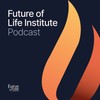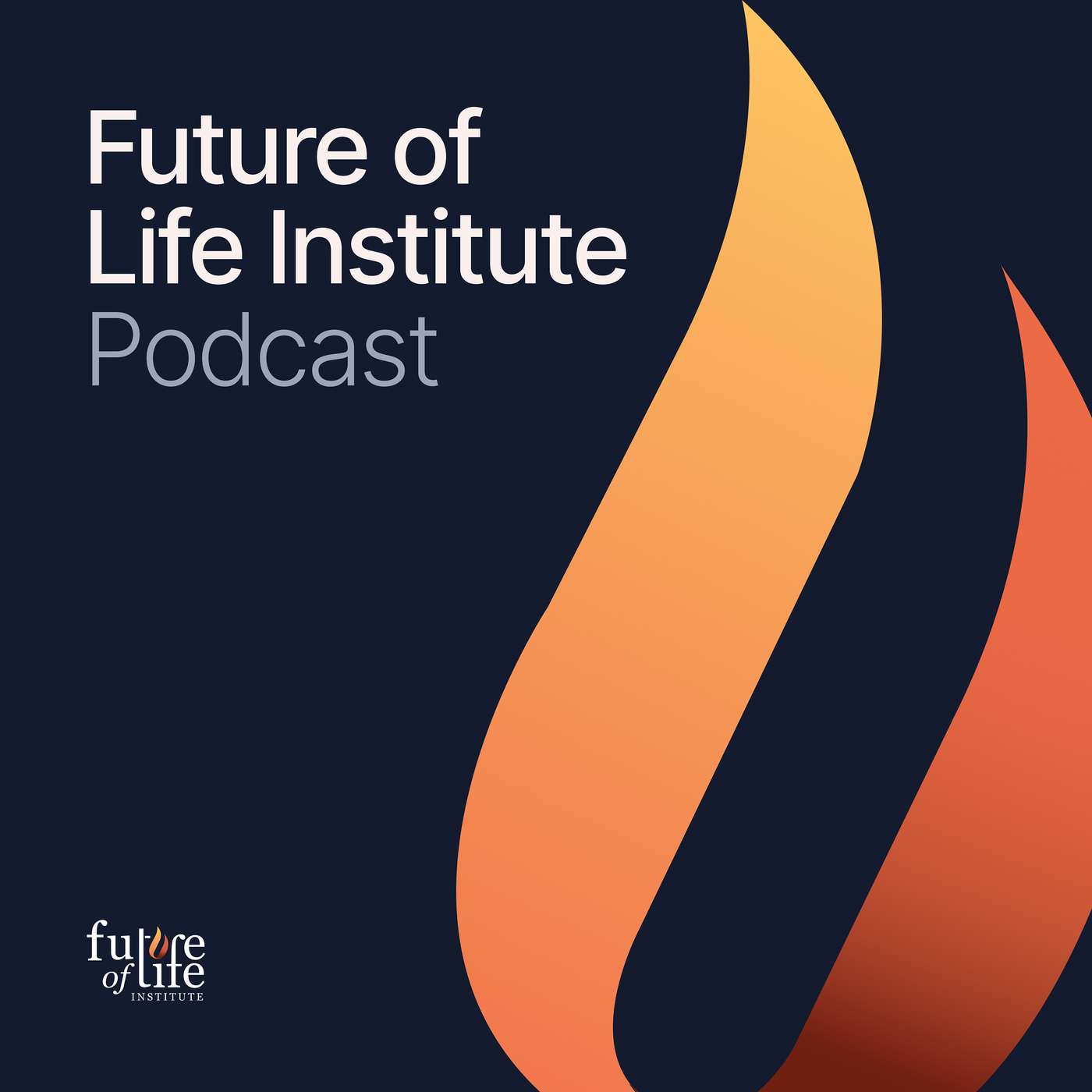

Future of Life Institute Podcast
Future of Life Institute
The Future of Life Institute (FLI) is a nonprofit working to reduce global catastrophic and existential risk from powerful technologies. In particular, FLI focuses on risks from artificial intelligence (AI), biotechnology, nuclear weapons and climate change. The Institute's work is made up of three main strands: grantmaking for risk reduction, educational outreach, and advocacy within the United Nations, US government and European Union institutions. FLI has become one of the world's leading voices on the governance of AI having created one of the earliest and most influential sets of governance principles: the Asilomar AI Principles.
Episodes
Mentioned books

Nov 8, 2024 • 1h 3min
Suzy Shepherd on Imagining Superintelligence and "Writing Doom"
Suzy Shepherd joins the podcast to discuss her new short film "Writing Doom", which deals with AI risk. We discuss how to use humor in film, how to write concisely, how filmmaking is evolving, in what ways AI is useful for filmmakers, and how we will find meaning in an increasingly automated world. Here's Writing Doom: https://www.youtube.com/watch?v=xfMQ7hzyFW4 Timestamps: 00:00 Writing Doom 08:23 Humor in Writing Doom 13:31 Concise writing 18:37 Getting feedback 27:02 Alternative characters 36:31 Popular video formats 46:53 AI in filmmaking49:52 Meaning in the future

Oct 25, 2024 • 1h 28min
Andrea Miotti on a Narrow Path to Safe, Transformative AI
Andrea Miotti joins the podcast to discuss "A Narrow Path" — a roadmap to safe, transformative AI. We talk about our current inability to precisely predict future AI capabilities, the dangers of self-improving and unbounded AI systems, how humanity might coordinate globally to ensure safe AI development, and what a mature science of intelligence would look like. Here's the document we discuss in the episode: https://www.narrowpath.co Timestamps: 00:00 A Narrow Path 06:10 Can we predict future AI capabilities? 11:10 Risks from current AI development 17:56 The benefits of narrow AI 22:30 Against self-improving AI 28:00 Cybersecurity at AI companies 33:55 Unbounded AI 39:31 Global coordination on AI safety 49:43 Monitoring training runs 01:00:20 Benefits of cooperation 01:04:58 A science of intelligence 01:25:36 How you can help

Oct 11, 2024 • 1h 31min
Tamay Besiroglu on AI in 2030: Scaling, Automation, and AI Agents
Tamay Besiroglu joins the podcast to discuss scaling, AI capabilities in 2030, breakthroughs in AI agents and planning, automating work, the uncertainties of investing in AI, and scaling laws for inference-time compute. Here's the report we discuss in the episode: https://epochai.org/blog/can-ai-scaling-continue-through-2030 Timestamps: 00:00 How important is scaling? 08:03 How capable will AIs be in 2030? 18:33 AI agents, reasoning, and planning 23:39 Automating coding and mathematics 31:26 Uncertainty about investing in AI 40:34 Gap between investment and returns 45:30 Compute, software and data 51:54 Inference-time compute 01:08:49 Returns to software R&D 01:19:22 Limits to expanding compute

Sep 27, 2024 • 2h 9min
Ryan Greenblatt on AI Control, Timelines, and Slowing Down Around Human-Level AI
Ryan Greenblatt joins the podcast to discuss AI control, timelines, takeoff speeds, misalignment, and slowing down around human-level AI. You can learn more about Ryan's work here: https://www.redwoodresearch.org/team/ryan-greenblatt Timestamps: 00:00 AI control 09:35 Challenges to AI control 23:48 AI control as a bridge to alignment 26:54 Policy and coordination for AI safety 29:25 Slowing down around human-level AI 49:14 Scheming and misalignment 01:27:27 AI timelines and takeoff speeds 01:58:15 Human cognition versus AI cognition

Sep 12, 2024 • 1h 20min
Tom Barnes on How to Build a Resilient World
Tom Barnes joins the podcast to discuss how much the world spends on AI capabilities versus AI safety, how governments can prepare for advanced AI, and how to build a more resilient world. Tom's report on advanced AI: https://www.founderspledge.com/research/research-and-recommendations-advanced-artificial-intelligence Timestamps: 00:00 Spending on safety vs capabilities 09:06 Racing dynamics - is the classic story true? 28:15 How are governments preparing for advanced AI? 49:06 US-China dialogues on AI 57:44 Coordination failures 1:04:26 Global resilience 1:13:09 Patient philanthropy The John von Neumann biography we reference: https://www.penguinrandomhouse.com/books/706577/the-man-from-the-future-by-ananyo-bhattacharya/

Aug 22, 2024 • 2h 16min
Samuel Hammond on why AI Progress is Accelerating - and how Governments Should Respond
Samuel Hammond joins the podcast to discuss whether AI progress is slowing down or speeding up, AI agents and reasoning, why superintelligence is an ideological goal, open source AI, how technical change leads to regime change, the economics of advanced AI, and much more. Our conversation often references this essay by Samuel: https://www.secondbest.ca/p/ninety-five-theses-on-ai Timestamps: 00:00 Is AI plateauing or accelerating? 06:55 How do we get AI agents? 16:12 Do agency and reasoning emerge? 23:57 Compute thresholds in regulation28:59 Superintelligence as an ideological goal 37:09 General progress vs superintelligence 44:22 Meta and open source AI 49:09 Technological change and regime change 01:03:06 How will governments react to AI? 01:07:50 Will the US nationalize AGI corporations? 01:17:05 Economics of an intelligence explosion 01:31:38 AI cognition vs human cognition 01:48:03 AI and future religions 01:56:40 Is consciousness functional? 02:05:30 AI and children

Aug 9, 2024 • 1h 3min
Anousheh Ansari on Innovation Prizes for Space, AI, Quantum Computing, and Carbon Removal
Anousheh Ansari joins the podcast to discuss how innovation prizes can incentivize technical innovation in space, AI, quantum computing, and carbon removal. We discuss the pros and cons of such prizes, where they work best, and how far they can scale. Learn more about Anousheh's work here: https://www.xprize.org/home Timestamps: 00:00 Innovation prizes at XPRIZE 08:25 Deciding which prizes to create 19:00 Creating new markets 29:51 How far can prizes scale? 35:25 When are prizes successful? 46:06 100M dollar carbon removal prize 54:40 Upcoming prizes 59:52 Anousheh's time in space

Jul 25, 2024 • 30min
Mary Robinson (Former President of Ireland) on Long-View Leadership
Mary Robinson joins the podcast to discuss long-view leadership, risks from AI and nuclear weapons, prioritizing global problems, how to overcome barriers to international cooperation, and advice to future leaders. Learn more about Robinson's work as Chair of The Elders at https://theelders.org Timestamps: 00:00 Mary's journey to presidency 05:11 Long-view leadership 06:55 Prioritizing global problems 08:38 Risks from artificial intelligence 11:55 Climate change 15:18 Barriers to global gender equality 16:28 Risk of nuclear war 20:51 Advice to future leaders 22:53 Humor in politics 24:21 Barriers to international cooperation 27:10 Institutions and technological change

Jul 11, 2024 • 1h 4min
Emilia Javorsky on how AI Concentrates Power
Emilia Javorsky joins the podcast to discuss AI-driven power concentration and how we might mitigate it. We also discuss optimism, utopia, and cultural experimentation. Apply for our RFP here: https://futureoflife.org/grant-program/mitigate-ai-driven-power-concentration/Timestamps: 00:00 Power concentration 07:43 RFP: Mitigating AI-driven power concentration 14:15 Open source AI 26:50 Institutions and incentives 35:20 Techno-optimism 43:44 Global monoculture 53:55 Imagining utopia

Jun 21, 2024 • 1h 32min
Anton Korinek on Automating Work and the Economics of an Intelligence Explosion
Anton Korinek joins the podcast to discuss the effects of automation on wages and labor, how we measure the complexity of tasks, the economics of an intelligence explosion, and the market structure of the AI industry. Learn more about Anton's work at https://www.korinek.com Timestamps: 00:00 Automation and wages 14:32 Complexity for people and machines 20:31 Moravec's paradox 26:15 Can people switch careers? 30:57 Intelligence explosion economics 44:08 The lump of labor fallacy 51:40 An industry for nostalgia? 57:16 Universal basic income 01:09:28 Market structure in AI


